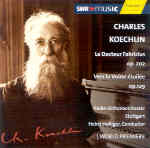Okay, I’m going to try to describe this, Charles Koechlin’s final major orchestral work, completed in 1946, premiered in 1949 (the year before his death), and then totally ignored until now. The music begins with the description of the gloomy manor of Dr. Fabricius, who describes in three dark polytonal chorales the sadness of the human condition. This in turn leads to a wild “revolt” against the uncaring universe in the form of an insane fugue, largely atonal, that includes the themes of sadness and culminates in an incredible passage for full orchestra, organ, and Ondes Martenot blasting out the choral “Aus tiefer Not” (i.e., De profundis), sounding very much like the opening of the Fifth Door in Bartók’s Bluebeard’s Castle.
From this point on, the music calms down to a contemplation of the cosmic oneness of it all (Le Ciel étoilé), and 10 minutes of increasing hopefulness leads at last to La Joie and a calm final chorale. It all lasts about 50 minutes, and if you love crazy late-Romantic orchestral music at its most extravagant and eccentric, then baby, your ship has come in! Heinz Holliger and the Stuttgart Radio Symphony Orchestra play the living daylights out of this irascible, improbable, and ultimately quite lovable curmudgeon of a piece, attacking the “revolt” fugue with unbridled virtuosity and getting into the mystical “innigkeit” side of things as only a very serious German band can in Le Ciel étoilé.
Vers la Voute étoilée sounds very much like that “étoilé” section of the larger work, only with a sonorous climax attached. It makes the perfect introduction to Le Docteur Fabricius, which (in case you cared) is based on a philosophical novel by the composer’s uncle Charles Dollfus. I’m not rushing out to read the original, particularly when instead I can enjoy Koechlin’s no doubt far more remarkable take on it. Gloriously rich and natural recorded sound puts the final touch on one of the most surprising and rewarding releases of this or any other year. Keep it coming, Hänssler and SWR! [4/29/2004]
































